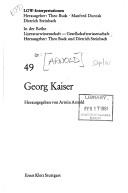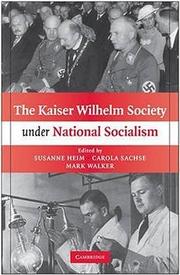| Listing 1 - 10 of 36 | << page >> |
Sort by
|

ISBN: 3123963004 Year: 1980 Publisher: Stuttgart
Abstract | Keywords | Export | Availability | Bookmark
 Loading...
Loading...Choose an application
- Reference Manager
- EndNote
- RefWorks (Direct export to RefWorks)
Book
ISBN: 3804400825 9783804400825 Volume: 289 Publisher: Hollfeld/Obfr.: Bange,
Abstract | Keywords | Export | Availability | Bookmark
 Loading...
Loading...Choose an application
- Reference Manager
- EndNote
- RefWorks (Direct export to RefWorks)
Kaiser, Georg --- Kaiser, Georg, --- Kaiser, Georg, - 1878-1945
Book
ISBN: 3111727068 3111112217 Year: 1888 Publisher: De Gruyter
Abstract | Keywords | Export | Availability | Bookmark
 Loading...
Loading...Choose an application
- Reference Manager
- EndNote
- RefWorks (Direct export to RefWorks)
To celebrate the 270th anniversary of the De Gruyter publishing house, the company is providing permanent open access to 270 selected treasures from the De Gruyter Book Archive. Titles will be made available to anyone, anywhere at any time that might be interested. The DGBA project seeks to digitize the entire backlist of titles published since 1749 to ensure that future generations have digital access to the high-quality primary sources that De Gruyter has published over the centuries.
Book
ISBN: 3486777610 3486777602 Year: 1950 Publisher: De Gruyter
Abstract | Keywords | Export | Availability | Bookmark
 Loading...
Loading...Choose an application
- Reference Manager
- EndNote
- RefWorks (Direct export to RefWorks)
To celebrate the 270th anniversary of the De Gruyter publishing house, the company is providing permanent open access to 270 selected treasures from the De Gruyter Book Archive. Titles will be made available to anyone, anywhere at any time that might be interested. The DGBA project seeks to digitize the entire backlist of titles published since 1749 to ensure that future generations have digital access to the high-quality primary sources that De Gruyter has published over the centuries.

ISBN: 9780511576355 9780521879064 9780521181549 0511576358 9780511534331 0511534337 052187906X 9780521879 9789780521875 0521181542 1107199298 1283331098 0511534027 9786613331090 0511532628 0511531710 0511533535 Year: 2009 Publisher: New York, NY : Cambridge University Press,
Abstract | Keywords | Export | Availability | Bookmark
 Loading...
Loading...Choose an application
- Reference Manager
- EndNote
- RefWorks (Direct export to RefWorks)
During the first part of the twentieth century, German science led the world. The most important scientific institution in Germany was the Kaiser Wilhelm Society, including institutes devoted to different fields of scientific research. These researchers were not burdened by teaching obligations and enjoyed excellent financial and material support. When the National Socialists came to power in Germany, all of German society, including science, was affected. The picture that previously dominated our understanding of science under National Socialism from the end of the Second World War to the recent past - a picture of leading Nazis ignorant and unappreciative of modern science and of scientists struggling to resist the Nazis - needs to be revised. This book surveys the history of Kaiser Wilhelm Institutes under Hitler, illustrating definitively the cooperation, if not collaboration, between scientists and National Socialists in order to further the goals of autarky, racial hygiene, war, and genocide.
Science and state --- National socialism and science --- Science and national socialism --- Science --- Science policy --- State and science --- State, The --- History. --- Government policy --- Kaiser Wilhelm-Gesellschaft zur Förderung der Wissenschaften. --- Kaizā Uiruherumu Gakujutsu Shinkō Kyōkai --- Kaiser-Wilhelm-Gesellschaft --- Kaizā Viruherumu Kagaku Shinkō Kyōkai --- Kaiser-Wilhelm Institute --- Kaiser Wilhelm Society --- KWG --- K.W.G. --- KWS --- K.W.S. --- Max-Planck-Gesellschaft zur Förderung der Wissenschaften --- Arts and Humanities --- History --- Kaiser Wilhelm-Gesellschaft zur Forderung der Wissenschaften.
Book
ISBN: 9783110300857 3110300850 3110364786 311038003X Year: 2014 Publisher: Berlin ; Boston : De Gruyter (A),
Abstract | Keywords | Export | Availability | Bookmark
 Loading...
Loading...Choose an application
- Reference Manager
- EndNote
- RefWorks (Direct export to RefWorks)
Die „Chronographia“ des Michael Psellos (der Titel stammt nicht vom Autor selbst) ist ein herausragendes Werk der byzantinischen historiographischen Literatur. Es wurde im dritten Viertel des 11. Jahrhunderts in Konstantinopel verfasst und bietet nicht nur eine allgemeine Darstellung der Zeit zwischen 986 und 1075 mit dem Schwerpunkt auf der Charakterisierung der in diesem Zeitraum regierenden Kaiser und Kaiserinnen, sondern gibt vielfältige Einblicke auch in das eigene Denken des Autors und in seine Rolle als kaiserlicher Berater und als Person in ihrem intellektuellen Umfeld. Es dient auch als Rechtfertigungsschrift für sein eigenes Agieren auf der politischen und weltanschaulichen Bühne der Zeit in einem komplizierten sozialen Netz am und um den Kaiserhof.Das Werk ist seit 1926 in alle wichtigen und auch kleinere moderne europäische Sprachen übersetzt worden, hier jedoch zum ersten Mal ins Deutsche. Die Übersetzung und der beigegebene griechische Text beruhen auf der neuen kritischen Ausgabe des Originaltextes, die gleichzeitig in der Reihe Millennium-Studien erscheint. Für diese Neuausgabe wurden der codex unicus und das in einer zweiten Handschrift erhaltene Fragment neu kollationiert sowie die gesamte philologische Beschäftigung mit dem sehr korrupten Text seit der Erstausgabe von 1874 aufgearbeitet und in einem textkritischen Kommentar ausgewertet. This masterpiece of Byzantine literature is now available for the first time in a German translation. The Greek text is based on a new critical edition appearing in the Millennium Studies series. The imperial counselor, polymath, and writer Michael Psellos (1018-ca. 1076) portrays the rulers of Byzantium from Basil II to Michael VII, and, along the way, provides an extensive account of his own role and life.
Biographie. --- Kaiser. --- 11th century Byzantium. --- Byzanz im 11. Jahrhundert. --- Kaiserbiographie. --- lives of the emperors. --- Byzantine Empire --- History
Book
ISBN: 1282472860 9786612472862 1584658142 9781584658146 9781584657354 1584657359 Year: 2008 Publisher: Hanover : University Press of New England,
Abstract | Keywords | Export | Availability | Bookmark
 Loading...
Loading...Choose an application
- Reference Manager
- EndNote
- RefWorks (Direct export to RefWorks)
Practical advice (supported by extensive case studies) for fixing troubled arts organizations
Performing arts --- Show business --- Arts --- Performance art --- Management. --- Kaiser, Michael M. --- Management --- E-books --- Arts du spectacle --- Gestion
Book
ISBN: 3952454268 Year: 2017 Publisher: LIBRUM Publishers & Editors LLC
Abstract | Keywords | Export | Availability | Bookmark
 Loading...
Loading...Choose an application
- Reference Manager
- EndNote
- RefWorks (Direct export to RefWorks)
Die Goldbüste des Kaisers Septimius Severus (193–211 n. Chr.) wurde im Jahr 1965 in Didymoteicho, dem antiken Plotinopolis (Nordgriechenland) gefunden. Dieser überaus seltene Fund hochstehender Goldschmiedearbeit liegt erstmals ausführlich untersucht und bebildert vor. Es handelt sich um die eine von nur zwei erhaltenen größeren Goldbüsten römischer Kaiser; das zweite, leicht unterlebensgroße Exemplar ist die Büste von Marc Aurel aus Avenches (Schweiz). Die 28 cm hohe Goldbüste des Septimius Severus wiegt knapp drei römische Pfund (980 g) und entspricht somit einem vielfach für solche Objekte verwendeten Gewichtsmodul. Goldporträts waren dem Kaiser vorbehalten. Als portable Bildnisse konnten sie den Kaiser bei offiziellen Handlungen wie am Gericht vertreten, sie dienten aber auch im Kaiserkult sowie in der römischen Armee, wo sie an der Spitze von Standarten mitgetragen wurden. Mit Beiträgen von Alessandra Giumlia-Mair Fotos der Goldbüste des Septimius Severus von Thanos Kartsoglou
Septimius --- Gold --- Severus --- Plotinopolis --- Ikonographie --- Goldschmiede --- Römisches Reich --- Kaiser --- Punzieren --- Ritus --- Bildnisse --- Büsten --- Griechenland --- Marc Aurel --- Münzen --- Treiben
Book
ISBN: 9783515128759 9783515128797 3515128794 3515128751 Year: 2021 Volume: 11 Publisher: Stuttgart : Franz Steiner Verlag,
Abstract | Keywords | Export | Availability | Bookmark
 Loading...
Loading...Choose an application
- Reference Manager
- EndNote
- RefWorks (Direct export to RefWorks)
Die Chronica urbis Romae erzählen von den mythischen Ursprüngen Roms, nennen zahlreiche Heroen der römischen Republik und berichten über Details aus der Regierungszeit von 58 Kaisern. Der ca. 334 n. Chr. verfasste Text beginnt mit Picus, Saturni filius, und endet mit Kaiser Licinius, den Constantin 325 n. Chr. ermorden ließ. Überliefert sind die Chronica urbis Romae als Teil eines spätantiken Sammelwerks, das unter dem Namen Chronograph von 354 bekannt ist. Beide Begriffe wurden von Theodor Mommsen geprägt.Günther Pfund prüft in seinem historischen Kommentar eingehend, inwieweit die Chronica urbis Romae zuverlässig sind. Besonders ausführlich behandelt er deren Angaben zu den Regierungszeiten, den Geldspenden (congiaria), den Baumaßnahmen und zum Tod der Kaiser. Dabei schließt Pfund Lücken in der Analyse von Einzelaspekten, die R.W. Burgess 2014 publiziert hat, und ergänzt dessen Resultate. Abschließend bietet der Kommentar Reflexionen zur Verfasserintention und zur Gattungsgeschichte sowie Vergleiche mit historischen Breviarien.
Calendrier romain. --- Empereurs --- Rome --- E-books --- Kommentar --- Chronograph --- Kaiser --- Stadtchronik --- Chronographus anni 354 --- Italien --- Latium --- (Produktform)Electronic book text --- Baumaßnahmen römischer Kaiser --- Breviarium Vindobonense --- Chronica urbis Romae --- Chronograph of 354 --- Chronograph von 354 --- Congiaria --- Geldspenden römischer Kaiser --- Geschichtsschreibung der Spätantike --- Historischer Kommentar --- Kalender des Filocalus --- Liberalitas römischer Kaiser --- Regierungszeiten römischer Kaiser --- Stadtchronik von Rom --- Todesursachen römischer Kaiser --- römische Geschichte in Listenform --- spätantike Breviarien --- (VLB-WN)9553 --- Städtechronik --- Stadt --- Chronik --- Kaisertum --- Herrscher --- Kaiserin --- Kaiserreich --- Chronoskop --- Chronograf --- Uhr --- Kommentare --- Kommentierung --- Origo gentis Romanorum --- 03 --- -Italien --- Italia --- Königreich Italien --- Repubblica Italiana --- Italiya Respublikasi --- Italijos Respublika --- Olaszorszaǵ --- Olasz Koz̈taŕsasaǵ --- Regno d'Italia --- Italienische Republik --- République Italienne --- Yidali-gongheguo --- Italy --- Italiener --- Königreich Sardinien --- Republik von Salò --- 17.03.1861 --- -Consiglio Regionale --- Lazio --- Giunta --- Presidenza --- Regione Lazio
Book
ISBN: 1281250694 9786611250690 1402067186 1402067178 Year: 2008 Volume: 260 Publisher: New York, N.Y. : Springer Berlin Heidelberg,
Abstract | Keywords | Export | Availability | Bookmark
 Loading...
Loading...Choose an application
- Reference Manager
- EndNote
- RefWorks (Direct export to RefWorks)
The book offers a history of the agricultural sciences in Nazi Germany. It analyzes scientific practice under the Nazi regime, Nazi agricultural policy and autarkic strategies as well as expansion policy in Eastern Europe. It also offers new insights into the Auschwitz concentration camp. It outlines the Nazi’s comprehensive nutritional and agricultural research program intended to prepare Germany for war by raising productivity through scientific means, researching the relation between nutrition and performance at the edge of starvation, and restructuring the agricultural economy of the continent. The book reveals the relation between science and power in Nazi Germany beyond the usual dichotomy that paints scientists in Nazi Germany either as victims of oppression or as sadistic beasts. It shows the involvement of a high ranking scientific elite in the Nazi regime of occupation and looting of cultural goods in the occupied eastern territories – largely for the sake of their own careers. The main audience the book addresses are students of history and the history of science, and anyone interested in the history of Nazi Germany.
Plant breeding --- Animal breeding --- Agriculture --- Science and state --- National socialism and science. --- Research --- History. --- History --- Kaiser Wilhelm-Gesellschaft zur Förderung der Wissenschaften. --- Kaizā Uiruherumu Gakujutsu Shinkō Kyōkai --- Kaiser-Wilhelm-Gesellschaft --- Kaizā Viruherumu Kagaku Shinkō Kyōkai --- Kaiser-Wilhelm Institute --- Kaiser Wilhelm Society --- KWG --- K.W.G. --- KWS --- K.W.S. --- Max-Planck-Gesellschaft zur Förderung der Wissenschaften --- Science and national socialism --- Science --- Farming --- Husbandry --- Industrial arts --- Life sciences --- Food supply --- Land use, Rural --- Domestic animals --- Breeding --- Crops --- Agricultural economics. --- Agriculture. --- Plant genetics. --- Animal physiology. --- History of Science. --- Agricultural Economics. --- History, general. --- Plant Genetics and Genomics. --- Animal Physiology. --- Animal physiology --- Animals --- Biology --- Anatomy --- Plants --- Genetics --- Agrarian question --- Agribusiness --- Agricultural economics --- Agricultural production economics --- Production economics, Agricultural --- Annals --- Auxiliary sciences of history --- Physiology --- Economic aspects --- Kaiser Wilhelm-Gesellschaft zur Forderung der Wissenschaften.
| Listing 1 - 10 of 36 | << page >> |
Sort by
|

 Search
Search Feedback
Feedback About UniCat
About UniCat  Help
Help News
News